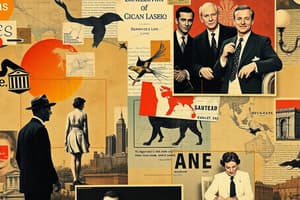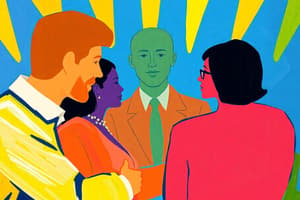Podcast
Questions and Answers
What can happen if a company's strategy is not adapted to the changing needs of the situation?
What can happen if a company's strategy is not adapted to the changing needs of the situation?
- The company may go out of business in a few years. (correct)
- The company's strategy will become more effective.
- The company will experience a temporary setback.
- The company will continue to thrive in the long run.
Why do groups come together?
Why do groups come together?
- To isolate from others.
- For socializing purposes only.
- To accomplish a common purpose or goal. (correct)
- To compete with each other.
What happens to a group's beliefs, values, and behavior patterns over time?
What happens to a group's beliefs, values, and behavior patterns over time?
- They are forgotten and no longer apply.
- They are only applied to new members.
- They become taken for granted as the way to continue. (correct)
- They are constantly debated and changed.
What is a result of a group's shared learning process?
What is a result of a group's shared learning process?
What is a key aspect of a company's foundation?
What is a key aspect of a company's foundation?
Why do groups need to interact with their environment?
Why do groups need to interact with their environment?
What is a key aspect of a group's identity?
What is a key aspect of a group's identity?
What happens to newcomers in a group?
What happens to newcomers in a group?
What is the term used to describe the broad policies and ideological principles that guide a group's actions?
What is the term used to describe the broad policies and ideological principles that guide a group's actions?
Which of the following concepts refers to the implicit, unwritten rules for getting along in the organization?
Which of the following concepts refers to the implicit, unwritten rules for getting along in the organization?
What is the term used to describe how the organization views itself in terms of 'who we are', 'what is our purpose', and 'how we do things'?
What is the term used to describe how the organization views itself in terms of 'who we are', 'what is our purpose', and 'how we do things'?
Which of the following concepts is most closely related to the socialization or 'onboarding' process?
Which of the following concepts is most closely related to the socialization or 'onboarding' process?
What is the term used to describe the special competencies displayed by group members in accomplishing certain tasks?
What is the term used to describe the special competencies displayed by group members in accomplishing certain tasks?
Which of the following concepts is most closely related to the concept of 'the way we do things around here'?
Which of the following concepts is most closely related to the concept of 'the way we do things around here'?
What is the term used to describe the shared cognitive frames that guide the perceptions, thoughts, and language used by the members of a group?
What is the term used to describe the shared cognitive frames that guide the perceptions, thoughts, and language used by the members of a group?
Which of the following concepts is most closely related to the concept of 'a fair day's work for a fair day's pay'?
Which of the following concepts is most closely related to the concept of 'a fair day's work for a fair day's pay'?
What do common ways of thinking and perceiving in a group develop from?
What do common ways of thinking and perceiving in a group develop from?
What does the phrase 'Do the right thing' symbolize in Digital Equipment Corporation (DEC)?
What does the phrase 'Do the right thing' symbolize in Digital Equipment Corporation (DEC)?
What does the phrase 'Do your own thing' mean in Apple?
What does the phrase 'Do your own thing' mean in Apple?
What is often forgotten about culture in an organization?
What is often forgotten about culture in an organization?
What happens to the thoughts and emotions of the members of an organization over time?
What happens to the thoughts and emotions of the members of an organization over time?
What is a challenge that subsidiaries of companies that move to new countries often face?
What is a challenge that subsidiaries of companies that move to new countries often face?
What is a characteristic of companies with a strong and well-embedded corporate culture?
What is a characteristic of companies with a strong and well-embedded corporate culture?
What was the author asked to describe in the context of Ciba-Geigy?
What was the author asked to describe in the context of Ciba-Geigy?
Flashcards are hidden until you start studying
Study Notes
Formal Philosophy
- Guiding principles that shape actions towards stakeholders (e.g., "HP way" at Hewlett-Packard, culture statements at Netflix and Google)
- Influences decisions and behavior within an organization
Group Norms
- Implicit standards and values that evolve in working groups (e.g., "a fair day's work for a fair day's pay" at Bank Wiring Room)
- Shapes behavior and expectations within a group
Rules of the Game
- Unwritten rules for getting along in an organization (e.g., "the way we do things around here")
- Newcomers must learn these rules to become accepted members
Identity and Images of Self
- Organization's self-perception and purpose (e.g., "who we are," "what is our purpose")
- Influences behaviors and decisions within an organization
Embedded Skills
- Special competencies displayed by group members to accomplish tasks
- Often passed down through generations without being written down
Habits of Thinking and Mental Models
- Shared cognitive frames that guide perceptions, thoughts, and language used by group members
- Taught to new members during socialization or "onboarding" process
Formation of Culture
- Groups form for a purpose and survive based on accomplishing that purpose
- Success leads to established beliefs, values, and behavior patterns becoming part of the group's identity
- New members are expected to adopt these values and beliefs as "this is who we are"
Perception, Thought, Feeling, and Behavior
- Shared learning process broadens to language, thinking, and feeling as a group grows
- Common ways of thinking and perceiving develop, including "jargon," humor, and expressions
- Company identity influences how members think, feel, and behave
Studying That Suits You
Use AI to generate personalized quizzes and flashcards to suit your learning preferences.



